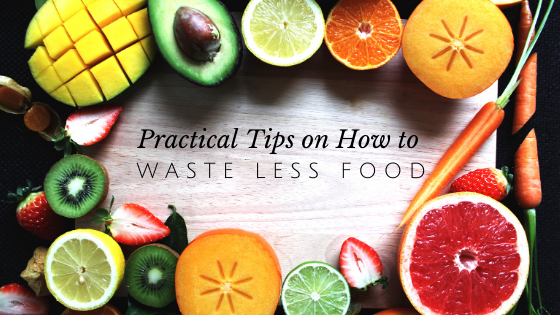7 Practical Tips on Wasting Less Food

According to the EPA, 38.1 million tons of food waste was created in 2017. It’s hard even to imagine how much one ton of food is, but 38.1 tons is unfathomable. Food waste is a problem for several reasons, and we can take small steps each day to do our part in lessening that number.
While you’re throwing away your hard-earned money on food you didn’t eat, you’re also contributing to the methane emissions and adding to your carbon footprint. Food waste will inevitably happen, but there are several helpful tips to keep it at a minimum. Try these seven handy tips on how to waste less food and be better for the environment in the process.
– Plan your meals
This might be obvious, but the key factor so many of us forget when planning our weekly shopping list is how many times we’ll use the ingredients called for in a recipe. Putting quantities on your list helps you avoid buying too much. It also will save you extra trips to the store when you realize you didn’t buy enough.
– Check your stash first
Ever run to the store to get more of a particular item, only to find you had plenty of it? With packaged goods like pasta, it’s not a big deal, but with things that have a shelf life, you wind up wasting more food. Look in your cabinets and fridge first. Some ingredients might not be obvious as to what you can use them for, so Google them, and you’ll be amazed at the recipes you can come up with using what you have on-hand.
– Don’t bulk buy unless you’re using it all
Bulk buying is useful for certain things, like toilet paper. If you have a large family, buying in bulk does help a lot in some instances with certain products. But buying bulk just to get a good deal? Not always a smart idea. Unless you can freeze it or it won’t expire any time soon, buying bulk might not be the best option. One way you can use bulk to your advantage, though, is to buy in bulk with a neighbor or family member. That way, you can split the cost and split the goods!
– Organize your food spaces
If you want to stop throwing out money from wasting food, start organizing. Clean out the fridge and keep a habit of putting older stuff in the front, so you remember to use it.
– Learn how to store food for optimum freshness
There are a few tricks you can learn about maximizing the freshness potential of fruits and vegetables in your fridge. Taking the time to properly store them once you bring them home will go a long way in preventing food waste. For example, berries shouldn’t be washed until you’re ready to eat them, and tomatoes, apples, and bananas can make other produce spoil faster — so keep them separated.
– Do your meal prep right after shopping
You are never going to snack on those veggies if you don’t prep them and have them at eye-level in your fridge. On the other hand, you’re much more likely to call for pizza delivery if you don’t have all your ingredients prepped for busy weeknights. Take the time to handle it when you have downtime. It may seem like a chore, but once you get into it, you’ll wind up with more free time to enjoy yourself with and less wasted food. Use this food prep time to listen to your favorite podcasts or a book on audible. Find something that makes you look forward to doing it — and it’ll become a mini-highlight of your week.
And finally…
Don’t overlook fruits and veggies past their prime. You can turn brown bananas into banana bread, make soups and stir-fry out of those veggies, and so much more. Even stale bread can become croutons or a superb French toast.
Learning how to make do with what you’ve got will help you cut out the food waste and have more money to spend on you!
